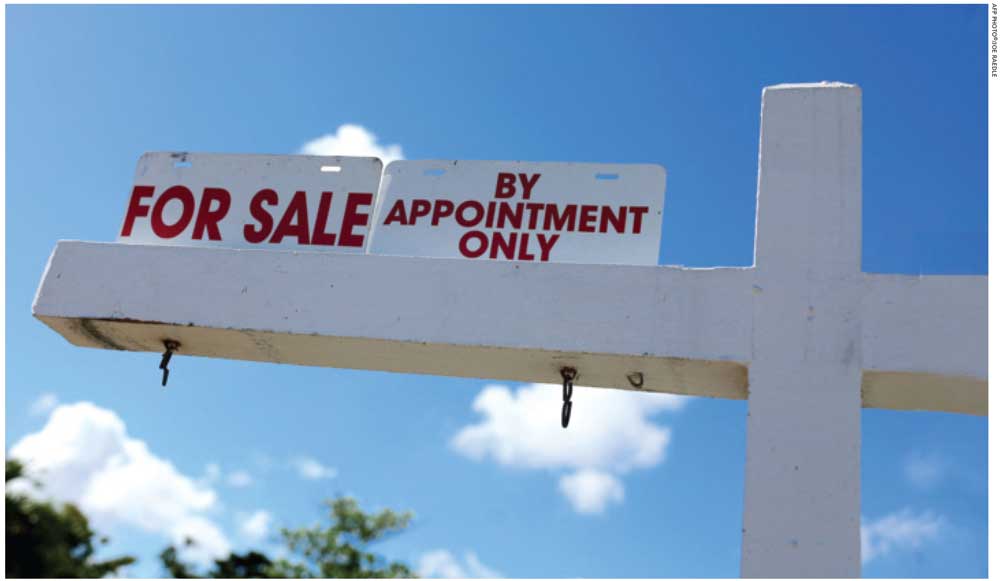MONEY LAUNDERING

THE REAL ESTATE SAGA
The US Treasury is taking steps to quell money laundering through property acquisitions – Rajika Jayatilake

Vietnam’s former prime minister Nguyễn Tâ´n Dũng says that it “is not a problem just for some countries; this is a global issue.” Corruption is indeed a global issue and it’s rampant in the real estate sector.
“Real estate has long been the preferred choice of criminals for hiding ill-gotten gains and manipulating property prices is one of the oldest known ways to transfer proceeds illegally between parties to a deal,” the OECD notes.
According to a recent study by Global Financial Integrity (GFI, which is an organisation that promotes increased transparency in the international financial system), an estimated US$ 2.3 billion was laundered through the real estate market in the US alone between 2015 and 2021.
In the United States, the real estate sector is minimally transparent, leading to corrupt individuals from around the world hiding behind anonymous shell companies and buying property in cash deals – and thereby flooding the market with illegal money.
These transactions are bolstered by a network of enablers comprising realtors, lawyers, financial advisors and staff of financial institutions. In connivance with them, kleptocrats siphon funds out of their countries into the real estate market stateside.
Buying property through shell companies and without mortgages or loans enables kleptocrats to evade most anti-money laundering laws, and not provide any personal information especially with regard to the ultimate beneficiaries of property deals.
This porous legal structure has led to the American residential and commercial property markets becoming a veritable haven for stolen assets and black money.
A recent study of 100 cases of money laundering through real estate in the US revealed that far more than 50 percent of the cases involved ‘politically exposed persons’ or individuals with direct connections to corruption overseas.
For a long time, banks in the US have been held responsible for knowing the sources of their customers’ funds and are required to report suspicious transactions to authorities.
As Secretary of the Treasury Janet Yellen points out however, the same stringent rules have not been applied to the real estate sector and criminals have taken advantage of this for decades by concealing ill-gotten gains in real estate through anonymous shell companies.
Anticorruption advocates say that loopholes in the American real estate regulatory system attract illegal money, which enters the economy with ease.
To get a grip on the situation and nip the rising trend of money laundering through the stateside property market therefore, the US Department of the Treasury’s Financial Crimes Enforcement Network (FinCEN) will soon be introducing stringent new regulations.
These regulations will require real estate professionals to divulge to FinCEN the names of the ultimate beneficiaries of businesses that acquire properties for cash. FinCEN submitted these regulations to the Office of Management and Budget (OMB) of the White House with the intention of formally proposing it in February.
Meanwhile, a new report by Transparency International (TI) claims that America is lagging behind other developed nations in its anti-money laundering structure for the property market. This report compares data from 21 countries, nine of which are in the Organization for Economic Cooperation and Development, and researchers categorise the US as a ‘singular outlier’ among the surveyed countries.
Furthermore, the Pandora Papers investigation carried out by the International Consortium of Investigative Journalists (ICIJ) in 2021 revealed that highly secretive trusts were set up to buy properties using stolen assets.
The report by TI contends that stringent regulations should also rope in these fraudulent trusts. ICIJ identified 206 trusts based stateside that held over a billion US Dollars in mixed assets linked to 41 countries. And close to 30 trusts had connections with alleged international criminals and human rights abusers.
Although FinCEN made it obligatory for real estate professionals in certain cities such as New York City to disclose the beneficial owners of properties, anticorruption advocates point out that patchwork regulations are hard to enforce.
Executive Director of Transparency International’s US Office Gary Kalman says: “It’s unknown if the new rule will target both residential and commercial transactions or if the latter will be addressed through a separate rule making process.”
The United States Department of the Treasury believes that this anticipated proposal “will be an important step toward bringing greater transparency to this sector.” It is also considering the “next steps with regard to addressing the illicit finance risks associated with the US commercial real estate sector.”
Meanwhile, the Executive Director of the Financial Accountability and Corporate Transparency (FACT) Coalition Ian Gary notes: “This long delayed step will plug a gaping loophole in our anti-money laundering rules to make sure that drug traffickers, Russian oligarchs and environmental criminals can’t hide their wealth in US real estate.”
FACT aims to stop anonymous shell companies from harbouring stolen assets.
In the words of Scottish philosopher David Hume, “the corruption of the best things give rise to the worst.”
Ian Gary
Executive Director
Financial Accountability and
Corporate Transparency Coalition





Leave a comment